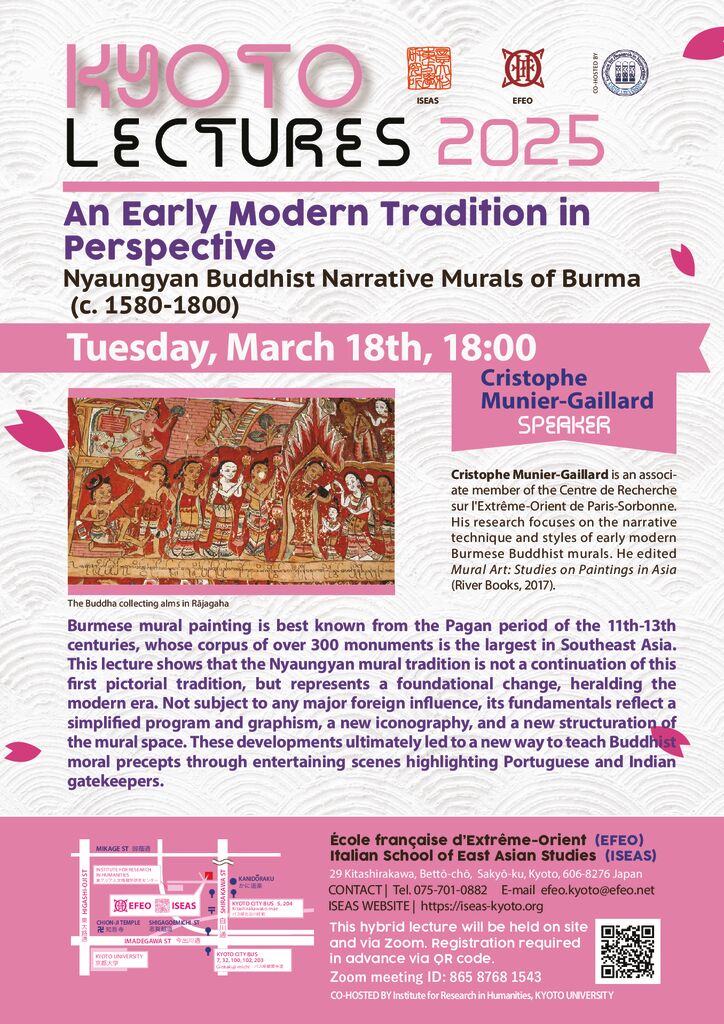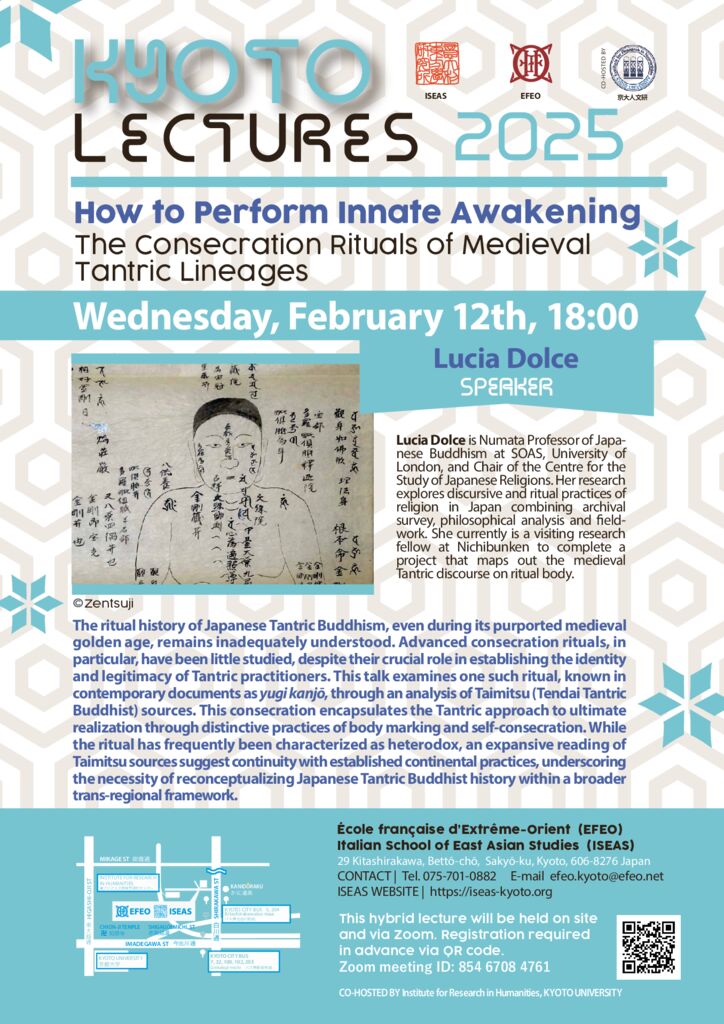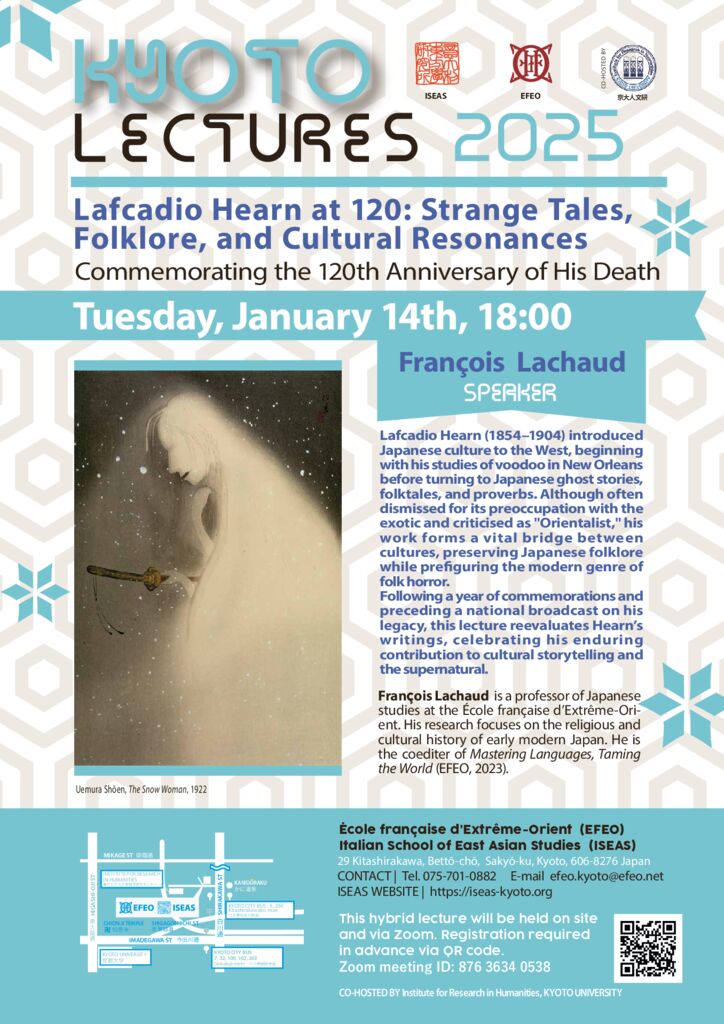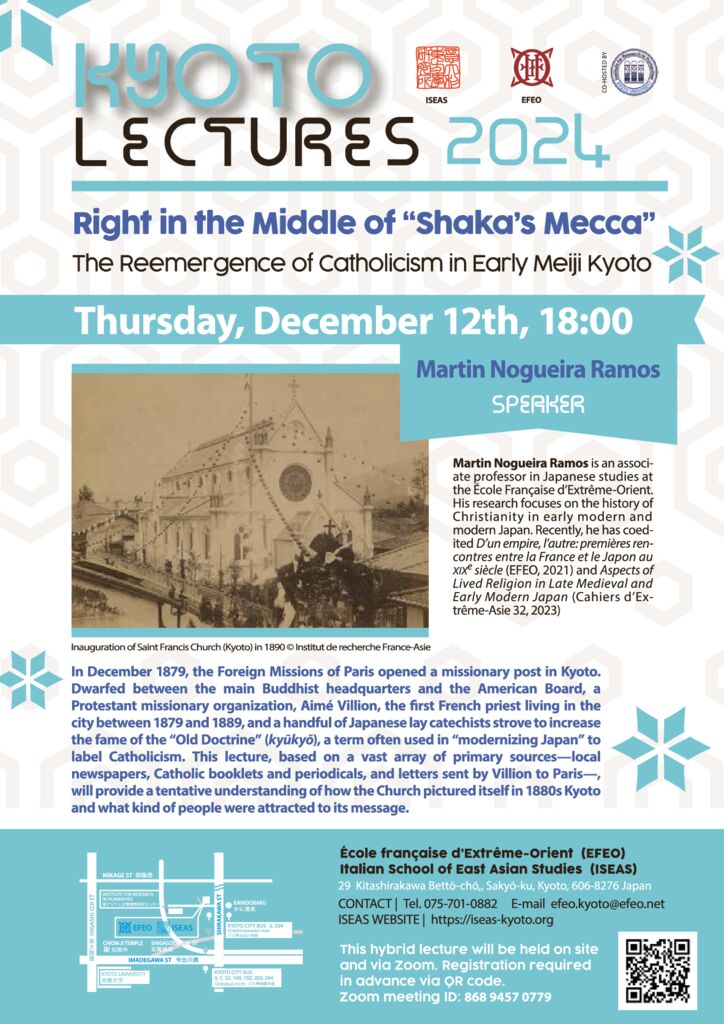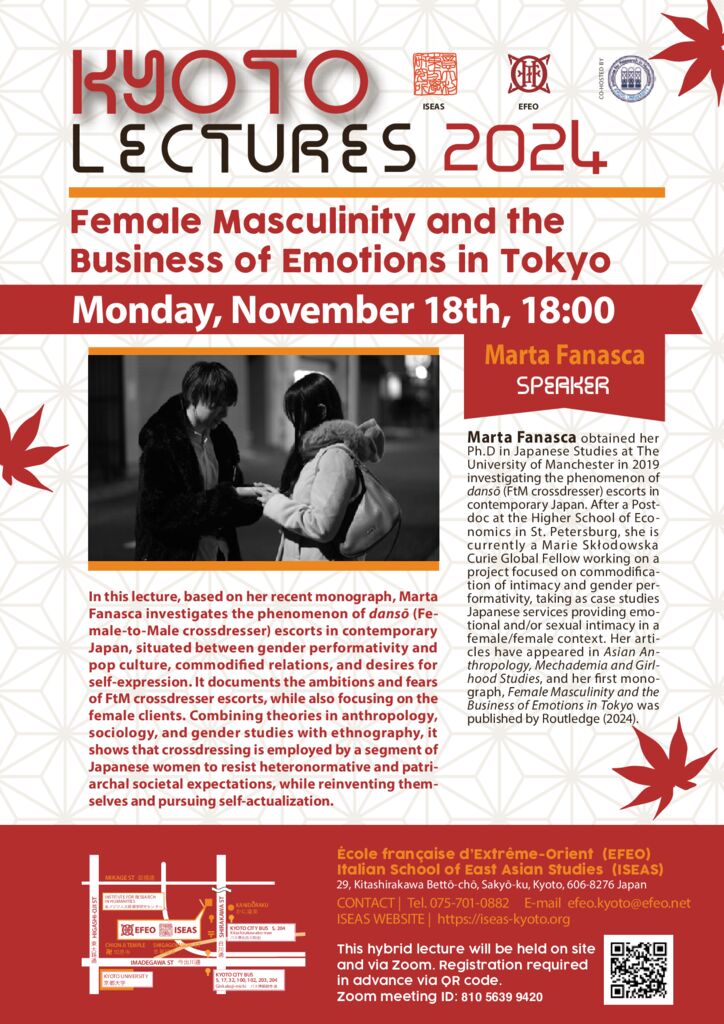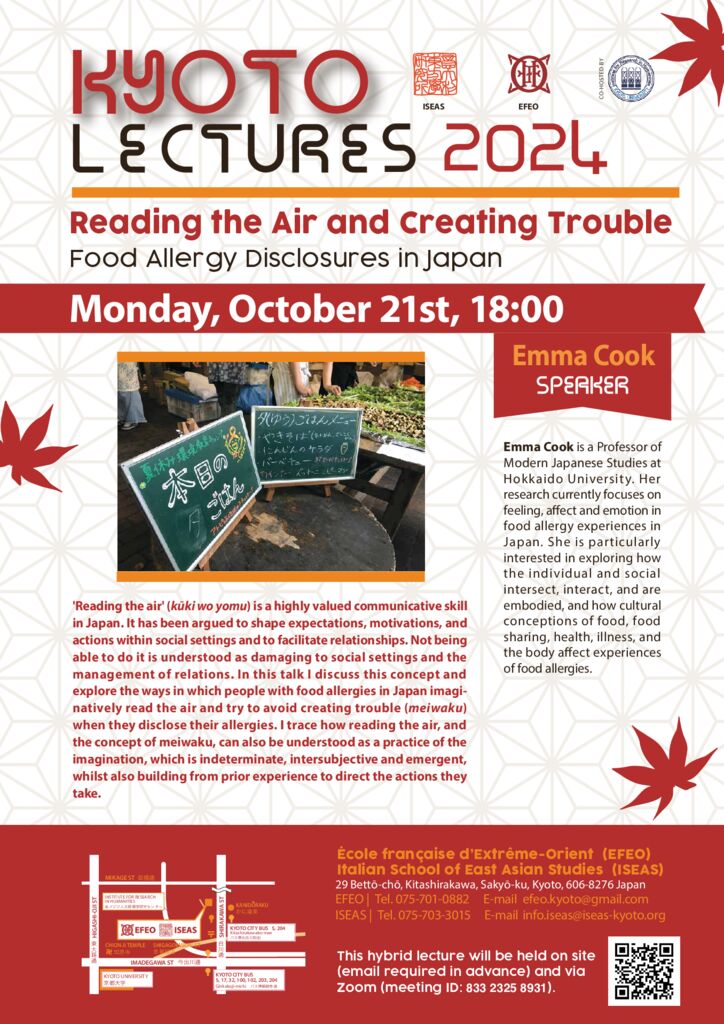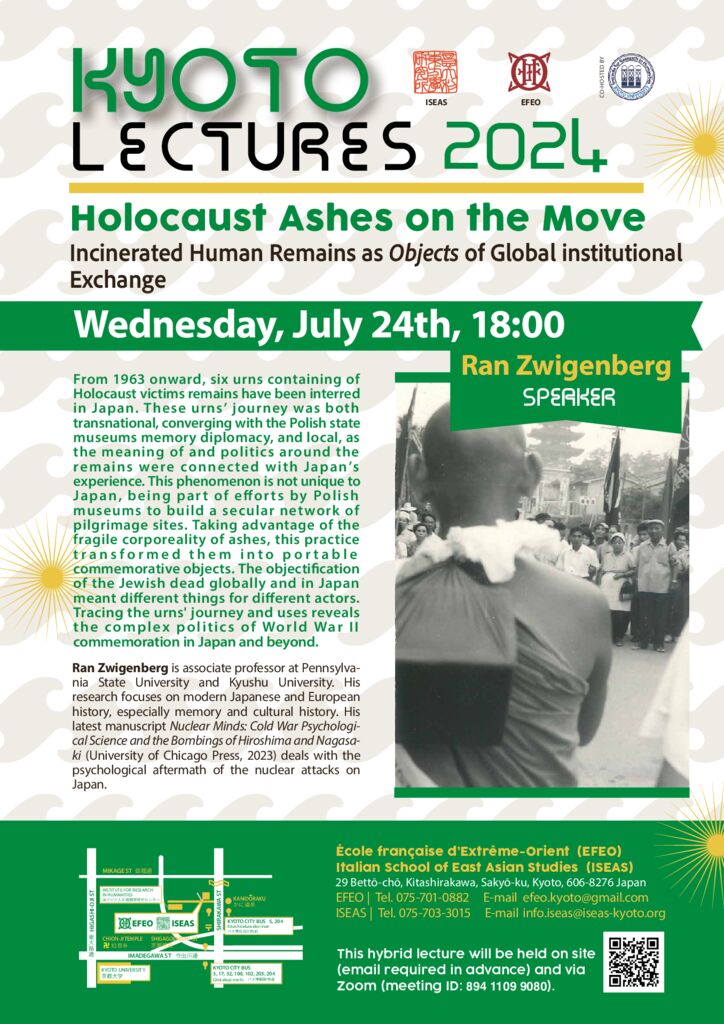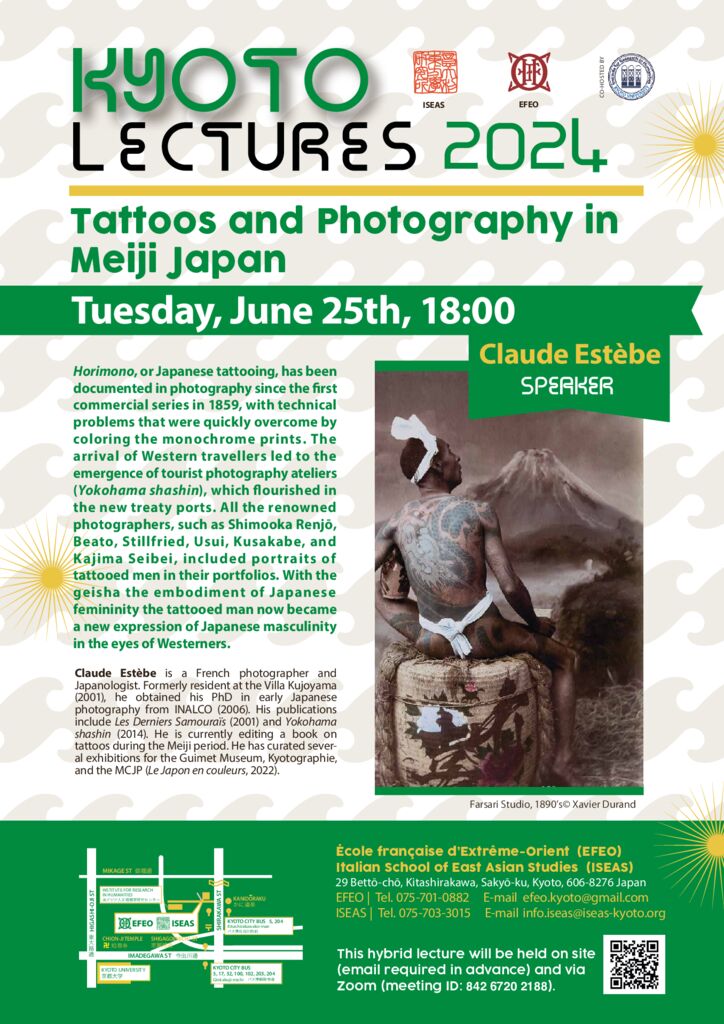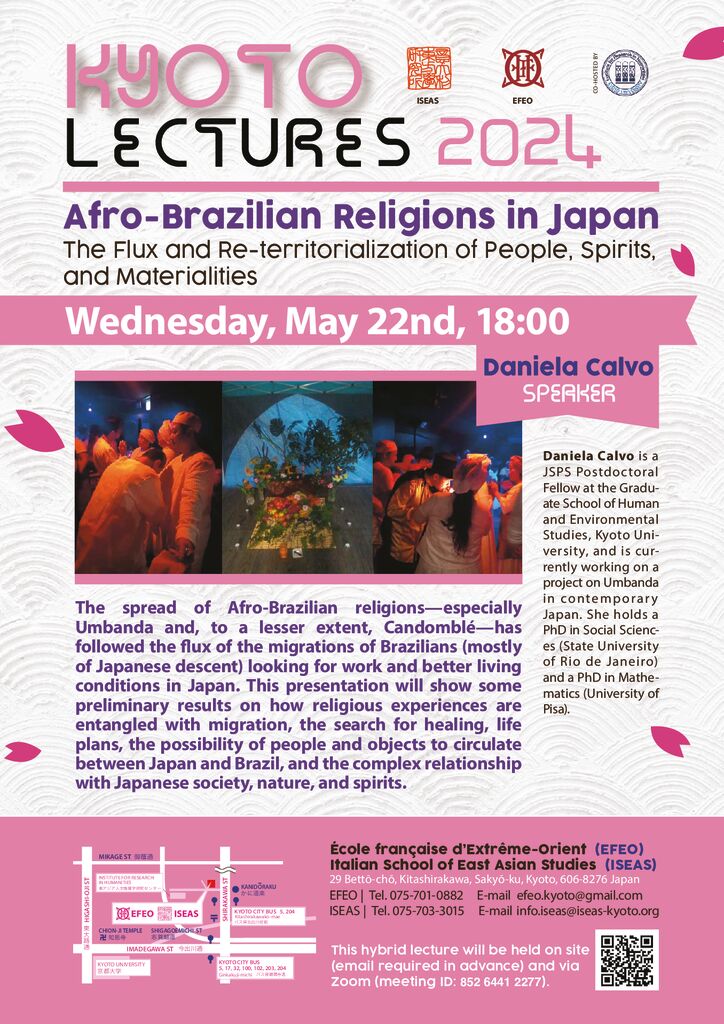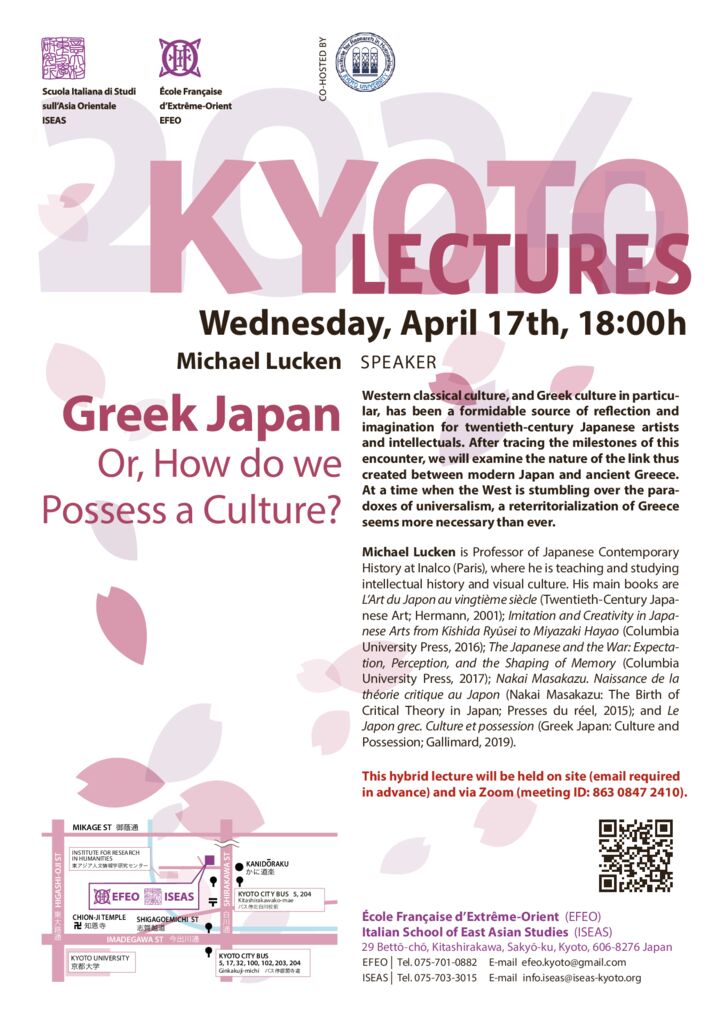Kyoto Lectures
An Early Modern Tradition in Perspective
Nyaungyan Buddhist Narrative Murals of Burma (c. 1580-1800)
Cristophe Munier-Gaillard
2025年3月18日 18:00
Burmese mural painting is best known from the Pagan period of the 11th-13th centuries, whose corpus of over 300 monuments is the largest in Southeast Asia. This lecture shows that the Nyaungyan mural tradition is not a continuation of this first pictorial tradition, but represents a foundational change, heralding the modern era. Not subject to any major foreign influence, its fundamentals reflect a simplified program and graphism, a new iconography, and a new structuration of the mural space. These developments ultimately led to a new way to teach Buddhist moral precepts through entertaining scenes highlighting Portuguese and Indian gatekeepers.
Cristophe Munier-Gaillard is an associate member of the Centre de Recherche sur l’Extrême-Orient de Paris-Sorbonne. His research focuses on the narrative technique and styles of early modern Burmese Buddhist murals. He edited Mural Art: Studies on Paintings in Asia (River Books, 2017).
This hybrid lecture will be held on site (registration required in advance from here) and via Zoom.
Zoom Link: https://us02web.zoom.us/j/86587681543
Meeting ID: 865 8768 1543
Kyoto Lectures
How to Perform Innate Awakening
The Consecration Rituals of Medieval Japanese Tantric Lineages
Lucia Dolce
2025年2月12日 18:00
The ritual history of Japanese Tantric Buddhism, even during its purported medieval golden age, remains inadequately understood. Advanced consecration rituals, in particular, have been little studied, despite their crucial role in establishing the identity and legitimacy of Tantric practitioners. This talk examines one such ritual, known in contemporary documents as yugi kanjō, through an analysis of Taimitsu (Tendai Tantric Buddhist) sources. This consecration encapsulates the Tantric approach to ultimate realization through distinctive practices of body marking and self-consecration. While the ritual has frequently been characterized as heterodox, an expansive reading of Taimitsu sources suggest continuity with established continental practices, underscoring the necessity of reconceptualizing Japanese Tantric Buddhist history within a broader trans-regional framework.
Lucia Dolce is Numata Professor of Japanese Buddhism at SOAS, University of London, and Chair of the Centre for the Study of Japanese Religions. Her research explores discursive and ritual practices of religion in Japan combining archival survey, philosophical analysis and fieldwork. She currently is a visiting research fellow at Nichibunken to complete a project that maps out the medieval Tantric discourse on ritual body.
This hybrid lecture will be held on site (registration required in advance from here) and via Zoom.
Zoom Link: https://us02web.zoom.us/j/85467084761
Meeting ID: 854 6708 4761
Kyoto Lectures
Lafcadio Hearn at 120: Strange Tales, Folklore, and Cultural Resonances
Commemorating the 120th Anniversary of His Death
François Lachaud
2025年1月14日 18:00
Lafcadio Hearn (1854–1904) was a remarkable figure who introduced Japanese culture to the West during the Meiji era. Beginning his literary journey with explorations of voodoo traditions in New Orleans and the Caribbean, he later turned his attention to Japan, where he translated and retold ghost stories, folktales, legends, and proverbs, bringing these traditions to the Anglophone world. Despite his significant contributions, his work has often been dismissed, particularly in English-speaking academic circles, for its perceived fascination with the strange and the exotic, and critiqued as a product of “Orientalism.”
After a year of commemorations marking the 120th anniversary of his death, and before a national broadcast reflecting on his life and work, this lecture offers a timely reexamination of Hearn’s writings. It highlights their role in preserving and sharing Japanese folklore and supernatural tales, while also connecting them to the modern concept of folk horror, a genre that delves into the darker aspects of rural beliefs and traditions.
This lecture celebrates Hearn’s enduring legacy, showcasing his ability to bridge diverse cultural worlds and reminding us of the profound impact his storytelling continues to have on our understanding of culture, history, and the supernatural.
François Lachaud is a professor of Japanese studies at the École française d’Extrême-Orient. His research focuses on the religious and cultural history of early modern Japan. He is the coediter of Mastering Languages, Taming the World: The Production and Circulation of European Dictionaries and Lexicons of Asian Languages (16th–19th Centuries) (EFEO, 2023).
This hybrid lecture will be held on site (registration required in advance from here) and via Zoom.
Zoom Link: https://us02web.zoomus/j/87636340538
Meeting ID: 876 3634 0538
Kyoto Lectures
Right in the Middle of “Shaka’s Mecca”
The Reemergence of Catholicism in Early Meiji Kyoto
Martin Nogueira Ramos
2024年12月12日 18:00
In December 1879, the Foreign Missions of Paris opened a missionary post in Kyoto. Dwarfed between the main Buddhist headquarters and the American Board, a Protestant missionary organization, Aimé Villion, the first French priest living in the city between 1879 and 1889, and a handful of Japanese lay catechists strove to increase the fame of the “Old Doctrine” (kyūkyō), a term often used in “modernizing Japan” to label Catholicism. This lecture, based on a vast array of primary sources—local newspapers, Catholic booklets and periodicals, and letters sent by Villion to Paris—, will provide a tentative understanding of how the Church pictured itself in 1880s Kyoto and what kind of people were attracted to its message.
Martin Nogueira Ramos is an associate professor in Japanese studies at the École Française d’Extrême-Orient. His research focuses on the history of Christianity in early modern and modern Japan. Recently, he has coedited D’un empire, l’autre: premières rencontres entre la France et le Japon au xixe siècle (EFEO, 2021) and Aspects of Lived Religion in Late Medieval and Early Modern Japan (Cahiers d’Extrême-Asie 32, 2023).
This hybrid lecture will be held on site (registration required in advance from here) and via Zoom.
Zoom Link: https://us02web.zoom.us/j/86894570779
Meeting ID: 868 9457 0779
Kyoto Lectures
Female Masculinity and the Business of Emotions in Tokyo
Marta Fanasca
2024年11月18日 18:00
In this lecture, based on her recent monograph, Marta Fanasca investigates the phenomenon of dansō (Female-to-Male crossdresser) escorts in contemporary Japan, situated between gender performativity and pop culture, commodified relations, and desires for self-expression. The lecture documents the ambitions and fears of FtM crossdresser escorts, while also focusing on the female clients. Combining theories in anthropology, sociology, and gender studies with ethnography, it shows that crossdressing is employed by a segment of Japanese women to resist heteronormative and patriarchal societal expectations, while reinventing themselves and pursuing self-actualization.
Marta Fanasca obtained her Ph.D in Japanese Studies at The University of Manchester in 2019 investigating the phenomenon of dansō (FtM crossdresser) escorts in contemporary Japan. After a Postdoc at the Higher School of Economics in St. Petersburg, she is currently a Marie Skłodowska Curie Global Fellow working on a project focused on commodification of intimacy and gender performativity, taking as case studies Japanese services providing emotional and/or sexual intimacy in a female/female context. Her articles have appeared in Asian Anthropology, Mechademia, and Girlhood Studies, and her first monograph, Female Masculinity and the Business of Emotions in Tokyo is published by Routledge(2024).
This hybrid lecture will be held on site (registration required in advance from here) and via Zoom.
Zoom Link: https://us02web.zoom.us/j/81056399420
Meeting ID: 810 5639 9420
Kyoto Lectures
Reading the Air and Creating Trouble
Food Allergy Disclosures in Japan
Emma Cook
2024年10月21日 18:00
‘Reading the air’ (kūki wo yomu) is a highly valued communicative skill in Japan. It has been argued to shape expectations, motivations, and actions within social settings and to facilitate smooth relationships. Not being able to do it is understood as disruptive and damaging to social settings and the management of social relations. In this talk I discuss these concepts and explore the diverse ways in which people with food allergies in Japan are imaginatively reading the air and trying to avoid creating trouble (meiwaku) for others and themselves when they disclose their allergies. I trace how practices of reading the air, and the concept of meiwaku, can also be productively understood as a practice of the imagination, which is indeterminate, intersubjective and emergent, whilst also building from prior experience to direct the actions they take.
Emma Cook is a Professor of Modern Japanese Studies at Hokkaido University. Her research currently focuses on feeling, affect and emotion in food allergy experiences in Japan. She is particularly interested in exploring how the individual and social intersect, interact, and are embodied, and how cultural conceptions of food, food sharing, health, illness, and the body affect experiences of food allergies.
Lecture will be held exclusively online (register here) via Zoom (meeting ID: 833 2325 8931).
The meeting link will remain posted on the ISEAS website top page from October 19.
Kyoto Lectures
Holocaust Ashes on the Move
Incinerated Human Remains as Objects of Global Institutional Exchange
Ran Zwigenberg
July 24th, 2024 18:00
This lecture will be held on site and via Zoom
From 1963 onward, six urns containing of Holocaust victims remains have been interred in Japan. These urns’ journey was both transnational, converging with the Polish state museums memory diplomacy, as well as a very local one, as the meaning of and politics around the remains were intimately connected with Japan’s own experience. Indeed, this phenomenon is not unique to Japan. Polish museums have sent such urns all around Poland and globally, building a secular network of pilgrimage sites with its own relics and altars. Taking advantage of the fragile corporeality of ashes, this practice transformed them into portable commemorative objects. The (literal) objectification of the Jewish dead globally and in Japan meant different things for different actors in this story. Tracing the journey of the urns and their various uses, reveal the complex politics of transnational commemoration of World War II in its very local meanings in Japan and beyond.
Ran Zwigenberg is associate professor at Pennsylvania State University and Kyushu University. His research focuses on modern Japanese and European history, with a specialization in memory and cultural history. He has taught and lectured in the United States, Europe, Israel, and Japan, and published on issues of war memory, atomic energy, psychiatry, and survivor politics. His latest manuscript Nuclear Minds: Cold War Psychological Science and the Bombings of Hiroshima and Nagasaki (University of Chicago Press, 2023) deals with the psychological aftermath of the nuclear attacks on Japan. For more information on this and other projects, please see https://sites.psu.edu/zwigenberg/
This hybrid lecture will be held on site (email required in advance) and via Zoom (meeting ID: 894 1109 9080).
The meeting link will remain posted on the ISEAS website top page from July 22.
Kyoto Lectures
Tattoos and Photography in Meiji Japan
Claude Estèbe
June 25th, 2024 18:00
This lecture will be held on site and via Zoom
Horimono, or Japanese tattooing, has been documented in photography since the first commercial series in 1859, with technical problems that were quickly overcome by coloring the monochrome prints. The arrival of Western travellers led to the emergence of tourist photography ateliers (Yokohama shashin), which flourished in the new treaty ports. All the renowned photographers, such as Shimooka Renjō, Beato, Stillfried, Usui, Kinbei, and Kajima Seibei, included portraits of tattooed men in their portfolios. Alongside the geisha, the tattooed man became a new expression of Japanese masculinity in the eyes of Westerners.
Claude Estèbe is a French photographer and Japanologist. Formerly resident at the Villa Kujoyama (2001), he obtained his PhD in early Japanese photography from INALCO (2006). His publications include Les Derniers Samouraïs (2001) and Yokohama shashin (2014). He is currently editing a book on tattoos during the Meiji period. He has curated several exhibitions for the Guimet Museum, Kyotographie, and the MCJP (Le Japon en couleurs, 2022).
This hybrid lecture will be held on site (email required in advance) and via Zoom (meeting ID: 842 6720 2188).
The meeting link will remain posted on the ISEAS website top page from June 23.
Kyoto Lectures
Afro-Brazilian Religions in Japan: The Flux and Re-territorialization of People, Spirits, and Materialities
Daniela Calvo
May 22nd, 2024 18:00
This lecture will be held on site and via Zoom
The spread of Afro-Brazilian religions—especially Umbanda and, to a lesser extent, Candomblé—has followed the flux of the migrations of Brazilians (mostly of Japanese descent) looking for work and better living conditions in Japan. This presentation will show some preliminary results on how religious experiences are entangled with migration, the search for healing, life plans, the possibility of people and objects to circulate between Japan and Brazil, and the complex relationship with Japanese society, nature, and spirits.
Daniela Calvo is a JSPS Postdoctoral Fellow at the Graduate School of Human and Environmental Studies, Kyoto University, and is currently working on a project on Umbanda in contemporary Japan. She holds a PhD in Social Sciences (State University of Rio de Janeiro) and a PhD in Mathematics (University of Pisa).
This hybrid lecture will be held on site (email required in advance) and via Zoom (meeting ID: 852 6441 2277).
The meeting link will remain posted on the ISEAS website top page from May 20.
Kyoto Lectures
Greek Japan
Or, How do we Possess a Culture?
Michael Lucken
April 17th, 2024 18:00
This lecture will be held on site and via Zoom
Western classical culture, and Greek culture in particular, has been a formidable source of reflection and imagination for twentieth-century Japanese artists and intellectuals. After tracing the milestones of this encounter, we will examine the nature of the link thus created between modern Japan and ancient Greece. At a time when the West is stumbling over the paradoxes of universalism, a reterritorialization of Greece seems more necessary than ever.
Michael Lucken is Professor of Japanese Contemporary History at Inalco (Paris), where he is teaching and studying intellectual history and visual culture. His main books are L’Art du Japon au vingtième siècle (Twentieth-Century Japanese Art; Hermann, 2001); Imitation and Creativity in Japanese Arts from Kishida Ryūsei to Miyazaki Hayao (Columbia University Press, 2016); The Japanese and the War: Expectation, Perception, and the Shaping of Memory (Columbia University Press, 2017); Nakai Masakazu. Naissance de la théorie critique au Japon (Nakai Masakazu: The Birth of Critical Theory in Japan; Presses du réel, 2015); and Le Japon grec. Culture et possession (Greek Japan: Culture and Possession; Gallimard, 2019).
This hybrid lecture will be held on site (email required in advance) and via Zoom (meeting ID: 863 0847 2410).
The meeting link will remain posted on the ISEAS website top page from April 15.
